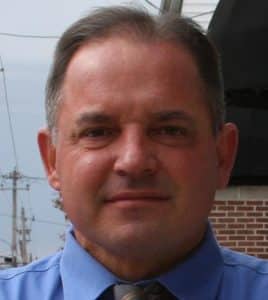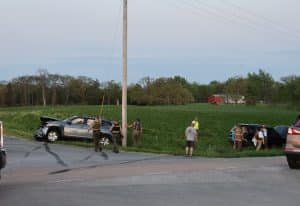Bivens reflects on ISP career

David Bivens
Dave Bivens of Waterloo remembers poring over his father’s homicide cases as a young boy, vicariously feeling the thrill of engaging in detective work.
“I saw other family members do (police work) over time and I just knew I wanted to do it,” he said.
In October, Bivens, 50, retired from the Illinois State Police after 28 years of fulfilling his childhood dream. Bivens said he is the last of a long line of family members to participate in law enforcement.
In total, his dad, two uncles, brother, sister-in-law, first cousin and he served a total of 178 years in the ISP. Bivens said that counts as the longest stint of any family in the state police.
“I’m extremely proud of that,” he said. “I couldn’t be prouder.”
Bivens’ family became the glue that held his career together as he served in the Swansea Village Police Department for seven years and with ISP for 21. For instance, Bivens used his dad’s practice of treating everyone the way he would treat a member of his family.
“If you do all of your work with that in mind, you are going to succeed,” he said.
The longtime police officer evidenced that when he won ISP Officer of the Year in 2006. At the time of receiving the award, Bivens served as the violent crimes commander in ISP Zone 6. Zone 6 is out of Collinsville and oversees 10 southern Illinois counties, including Madison, St. Clair and Monroe.
“It was a humbling experience in that I knew how much great work was being done throughout the ISP,” Bivens said.
To earn the recognition, Bivens led the investigation of a gruesome Tiffany Hall multiple murder case in East St. Louis. Hall was convicted in 2008 of killing her pregnant friend and unborn child and the victim’s three other children.
“Without that case, you don’t have me receiving that award,” he said.
The case details include Hall killing Jimella Tunstall in 2006, then cutting Tunstall open to steal the fetus from her womb. Hall told police that same day that someone sexually assaulted her and she gave birth to a stillborn child after the attack.
She visited the father of two of Tunstall’s children days later and told him that Tunstall wanted her to pick them up from him. Not knowing Hall’s intentions, he gave her the children, whom she drowned in the same bathtub where she killed the mother.
Bivens recalls finding the three children stuffed in a washer and dryer in Tunstall’s apartment, as well as laying each body, one by one, on a tarp.
“I will never forget that day,” he said. “I can tell every detail.”
As part of the Major Case Squad of Greater St. Louis, Bivens would find himself in the middle of another high-profile case, sitting across the table from Chris Coleman during a suspect interview at the Columbia Police Department in 2009.
“It felt like I was talking to a very cold person, and a very evil person,” Bivens said.
Coleman was sentenced in 2011 to three consecutive life sentences for strangling his wife and two sons inside their Columbia home — part of a scheme to start a life with his mistress without losing his job as a bodyguard for Joyce Meyer Ministries.
If it was known by the ministry that Coleman was having an affair — or got a divorce due to an affair on his part — it “could have definitely affected his job” with Joyce Meyer Ministries, Meyer said during the ensuing trial.
Major Joe Kollins, ISP Region 4 Commander, graduated from the police academy in the same class as Bivens. Kollins also served as his supervisor for the last year-and-a-half of Bivens’ career and said Bivens would give no less than 100 percent to his job.
“I’ve learned a long time ago that we’re all replaceable,” Kollins said. “What’s not replaceable is Dave’s work ethic, drive, experience and love for the job.”
Kollins said that Bivens solving the case surrounding the hit-and-run death of state trooper Kyle Deatherage “meant the most to me.” Deatherage was struck and killed in 2012 by a truck driven by Johnny Felton of Georgia on I-55 near Litchfield.
In retirement, Bivens said he will enjoy the outdoors with his family, having gone on a recent hunting trip with his daughters.
Bivens served as the commander of Zones 6 and 7 when he retired. In his time with ISP, Bivens solved some horrific cases and did so with the same amount of passion and thoroughness each time.
His resolve to carry out a successful career in law enforcement started with his family. After breaking into the ISP, he found that solving each case became about the victims and the family of the victims, another driving factor that led to his success through the years.
“(Finding closure for families) is one of the most rewarding things about my job,” he said.
“When you can find closure and ease the pain, it makes it all worth it.”






